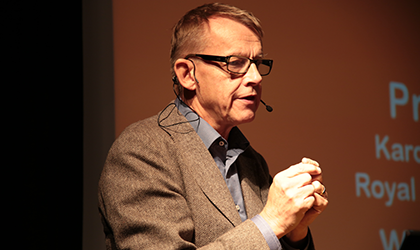They wrote: “Eleven years ago, the three of us, Hans Rosling, Ola Rosling & Anna Rosling Rönnlund founded Gapminder. In 2007 Hans decided to ‘drop out’ of university to work only 5% as professor at Karolinska Institute. That was a great decision. The 95% he worked for Gapminder made him a world famous public educator, or Edutainer as he liked to call it. Across the world, millions of people use our tools and share our vision of a fact-based worldview that everyone can understand. We know that many will be saddened by this message. Hans is no longer alive, but he will always be with us and his dream of a fact-based worldview, we will never let die!”
We at Significance have long admired Prof. Rosling’s work, sharing his passion for communicating statistics in a way that is informative, engaging and entertaining. Our former editor, Julian Champkin, was fortunate enough to interview Prof. Rosling for a 2009 article, in which he admitted to standing “in awe” of the man. Two years before that interview, RSS conference-goers enjoyed a lecture from Prof. Rosling on the subject of how to animate numbers.
Prof. Rosling became somewhat of a household name in 2010 when he fronted “The Joy of Stats”, a programme broadcast on the BBC. The hour-long show, which proved that “there’s nothing boring about stats”, can be watched via the Gapminder website, as can many of Prof. Rosling’s talks.
The core message of his lectures – backed by data – was that society, globally, had made great strides in tackling key issues of public health and human welfare in recent decades, but that many of these achievements go unrecognised. Prof. Rosling aimed to bring attention to these developments.
During the West Africa Ebola outbreak of 2014-15, Prof. Rosling spent three months working as an epidemiologist in the Liberian Health Ministry. He wrote for the BBC: “I had to join the response to this terrifying outbreak as I had research experience of many similar outbreaks in remote parts of Africa. I went there as a university professor, walked into the Ministry of Health and met Luke Bawo, the head of epidemiological surveillance. He asked me to join him as deputy head of epidemiological surveillance and we shared an office for the 12 weeks I worked in the ministry.” Ever the public educator, Prof. Rosling made a series of videos while in Liberia to explain some of the epidemiological concepts and concerns that health professionals were dealing with on the ground.
On his return from Liberia, Prof. Rosling continued his work to bring to light the advances made in human development. At a talk in London in October 2015, he introduced the audience to the concept of “factfulness”, which he defined as “the stress-reducing habit of only carrying opinions for which you have strong supporting facts”.
He was, as Maclean’s describes him, “A truth-teller in an age of ‘alternative facts'”. He will be missed.




